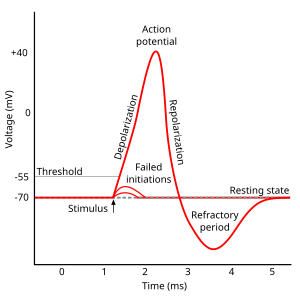This article needs additional citations for verification. (April 2013) |
This article's lead section may be too technical for most readers to understand. (January 2023) |
Refractoriness is the fundamental property of any object of autowave nature (especially excitable medium) not responding to stimuli, if the object stays in the specific refractory state. In common sense, refractory period is the characteristic recovery time, a period that is associated with the motion of the image point on the left branch of the isocline [B: 1] (for more details, see also Reaction–diffusion and Parabolic partial differential equation).

In physiology,[B: 2] a refractory period is a period of time during which an organ or cell is incapable of repeating a particular action, or (more precisely) the amount of time it takes for an excitable membrane to be ready for a second stimulus once it returns to its resting state following an excitation. It most commonly refers to electrically excitable muscle cells or neurons. Absolute refractory period corresponds to depolarization and repolarization, whereas relative refractory period corresponds to hyperpolarization.
Cite error: There are <ref group=B:> tags on this page, but the references will not show without a {{reflist|group=B:}} template (see the help page).
